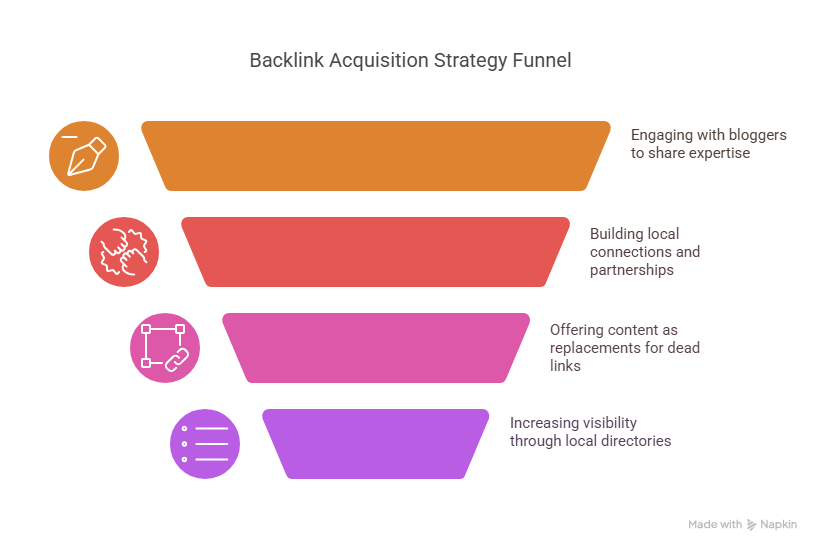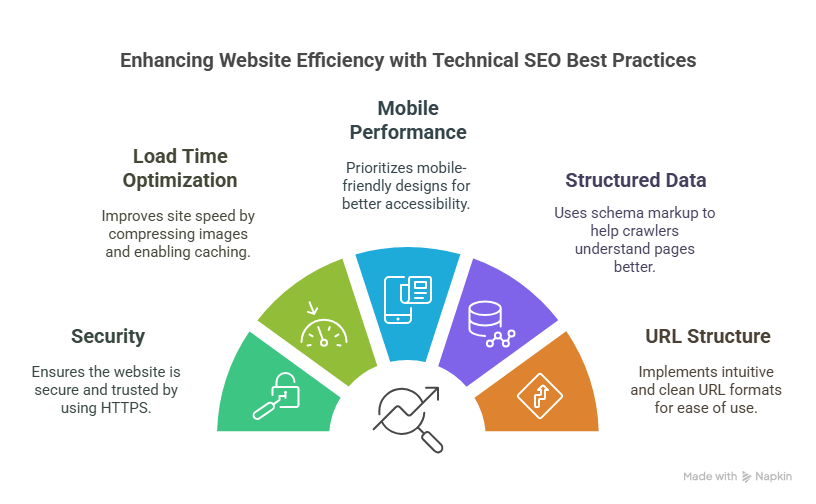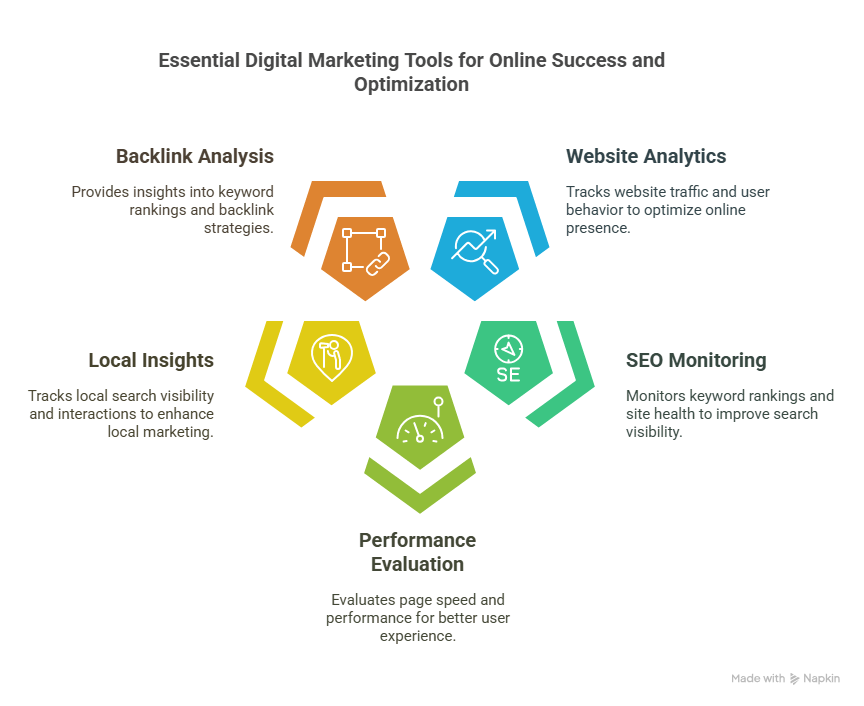Yes! I'd like to be contacted to schedule a consultation!
You might think pressure washing companies operate on word of mouth, but those casual recommendations are quickly being replaced by the ones offered by search engines. Nowadays, you could offer the best power washing services around, but if you’re not showing up when someone types “pressure washing” into Google, you’re losing valuable business.
The digital marketing experts at LinkNow have put together this guide to introduce pressure washing companies to the world of SEO. We’ll discuss what SEO is, the different factors that influence it, and provide tips for getting the most out of your efforts.
Search engine optimization (SEO) is the process of improving a website’s visibility on search engines, such as Google. It involves designing your website content, structure, and backlinking strategy to rank higher for search queries relevant to your pressure washing business.
There are many facets to SEO, which we’ll look at more in-depth later, but they all have the same goal: putting you in front of users who are searching for your pressure washing services and, in turn, generating new business. Essentially, when someone searches for “pressure washing company in [Your City],” you want to be one of the first options that comes up on the search engine results page (SERP). SEO helps you do that.
Strong SEO helps drive visits to your site and generate leads over time. To give an example of how this works, let’s say someone in your neighborhood has realized their deck is looking a bit mildewy. More often than not, they’ll turn to the internet to find a company that can provide the solution.
When they search on Google for something like “deck pressure washing near me,” they’re unlikely to scroll past the first few options and highly unlikely to go past the first page of results. In fact, less than 1% of searchers make it to the second page.
If your SEO efforts have been successful, you’ll be in those first few results, poised to gain more visits to your site and more customers.
SEO is broken down broadly into four main categories:
We’ll take a closer look at each below.
On-page SEO refers to everything you can do to improve the content and design of your pages so they rank better in search engine results.
Web crawlers are the bots that search engines use. These bots assess and index your web pages. They aim to understand the topic of your pages and evaluate how helpful your pages would be for users seeking information on that topic.
Helpfulness comes in a few forms: Your page should provide a thorough account of the topic, perhaps with some relevant images, and it should be easy for a user to navigate.
Let’s look at some of the factors that web crawlers will judge.
Keywords are the words or phrases users type when searching for specific information or services. A page’s primary keyword is the word it’s meant to rank for and its main topic, and it should be used in its title. “Pressure washing,” for example, is a primary keyword you’ll certainly want to have on your site.
Web crawlers look at keywords to judge what a page is about. Importantly, they also look for keyword clusters to see if a page is likely to contain helpful, relevant, and thorough information. For example, on a “Pressure Washing” page, they might view a page as more useful if it also mentions “driveway pressure washing” or even longer phrases like “how to remove mold and mildew from siding.”
Naturally incorporating clusters of related keywords tells web crawlers that your page is thorough in its coverage of its topic and likely to provide helpful information.
Types of keywords you could use on a pressure washing site include:

Your keywords should guide your content, giving you page titles and topics to include on each page. Pages should generally be at least 1,000 words, though you may see diminishing returns after about 1,500.
Structured pages also significantly help your SEO efforts. If pages are divided into subsections with well-chosen, keyword-rich headings, web crawlers find it easier to understand your page and rightly judge that users will, too.
Your content should also provide a mix of information on:
To show what a structured page might look like, here’s an example:
Images can be a great selling point for power washing. A before and after picture of a power-washed patio, for example, is a striking example of the value of your services.
To get the most out of your images:
Off-page SEO is everything you do outside your website to influence your rankings. The main aim of off-page SEO is to increase your website’s credibility and direct users to your website from various online spaces.
Let’s look at some of the factors:
Link building is the process of getting other sites to link to yours. These links are called backlinks. Search engines assess your backlinks for both quantity and quality. High-quality backlinks come from reputable, authoritative, and relevant websites. For example, a link from a reputable local deck contractor mentioning your business as a good option if a customer needs to clean their deck is a high-quality backlink.
Backlinks confirm your business’s legitimacy. If others want to point to your site, search engines will as well. Mentions, which are when another site mentions your company without a link, are also effective for this purpose.
Here are some strategies for gaining backlinks:

Social media doesn’t directly impact your SEO, but it’s a great place to grow visibility and traffic. You can share your content, blog posts, discounts, or photos and videos of your work. Pressure washing videos are especially good for social media. People like watching grime get blasted away! It’s a satisfying process and one that lends itself to getting shared.
To increase traffic, respond to comments to drive engagement, link back to your site in the caption, and keep your captions short.
Reviews are an essential factor in search engine rankings. Like backlinks, they serve as proof of your company’s quality, except they’re even more likely to influence users. Who wouldn’t prefer a pressure washer that comes recommended by a couple hundred other people?
When assessing your reviews, search engines look at the quantity and your average score. To get more reviews, share a link to leave a review after a successful service, either in a follow-up text or email on a receipt. You should also have a link to leave a review on your website. When you get positive reviews, take a moment to thank the reviewer for their feedback. This interaction goes a long way.
If you get a negative review, it’s not the end of the world. Take it as a chance to show that you care about your customers by responding professionally and potentially offering to fix the problem.
Local SEO encompasses your efforts to rank for searches with local intent, which means the search is likely to be looking for services in the user’s immediate area. Examples could include a user searching “pressure washing in [Your City],” “power washing near me,” or “driveway cleaning in [Your County].”
Pressure washing is an inherently local industry. You need to physically be at your customer’s location, or they need to bring something to you. Since it’s a local industry, it’s crucial you optimize for local searches.
When a search has local intent, Google displays what’s called the local pack or map pack, a map showing nearby businesses with the Google Business Profile (GBP) of the top three featured. Being in the local pack is the ultimate goal of local SEO. It gives you great visibility among those in your area who are actively looking to hire your services.
Here are some ways to get there:
The first step is to have a Google Business Profile. Without one, you’re missing out on a valuable resource for gaining credibility and visibility and obtaining reviews.
Here’s how to claim and optimize yours:
To improve your local SEO, you should also:
Technical SEO involves the behind-the-scenes changes you can make so that web crawlers have an easier time finding, crawling, and indexing your pages and users have an easier time interacting with your site. Overall, technical SEO aims to make your site secure, intuitive, and fast.
Here are some tips:

The best strategy for a pressure washing company is really a complete one. The gains you make in one area can quickly be offset by issues in another. With that said, local SEO is extremely important for pressure washing and local businesses in general. A 2024 study found that 80% of consumers in the US search for local businesses on a daily basis.
Having a GBP is crucial for local SEO—at LinkNow, setting up our clients with a GBP is one of the first things we do. After that, writing location-specific content and using location-based keywords can help you reach potential customers in your area. Reviews are also a significant factor in local rankings. Prompting customers to leave reviews and responding to the ones you get can make a big difference.
Beyond local SEO, make sure your site reaches a baseline performance level where you’re not waiting too long for it to load and it works well on mobile devices. Finally, make sure you have pages for all your services. You don’t want to miss out on driveway cleaning jobs because you only have pages on deck and siding pressure washing.
The goal of improving your SEO is to generate new business. Naturally, good SEO helps accomplish this objective by giving you more online visibility, which increases the number of people visiting your site, translating into more customers.
However, there are a few strategies you can use to turn site visitors into customers more efficiently:
SEO takes time. You need to build up a website’s worth of quality content rich with keywords and a strong off-page presence that adds credibility to your site. You also need to pay attention to your site’s performance and evolving SEO trends and adjust accordingly.
Here are a few ways to adjust and optimize your SEO strategy once you’ve got it off the ground:
SEO analytics refers to the process of using data to track and analyze website performance. It includes monitoring rankings, traffic, user behavior, backlinks, and technical site health. Over time, you can use analytics to optimize your SEO strategy and improve visibility, engagement, and conversions.
If it sounds complicated, there are some online tools that can help, including:

Search engines regularly update their algorithms for ranking pages to better reflect the changes in how users interact with them. A recent example is Google’s update to prioritize mobile sites since a growing number of users are searching on smartphones.
A trend to watch is voice search. Users are increasingly using Siri or at-home virtual assistant technologies to ask questions to search engines. You can optimize for voice search by including long-tail keywords, especially in question-and-answer formats.
For example, you could write a section on “Is It Safe To Pressure Wash a Wood Deck?” for a page on “Deck Pressure Washing.” This sort of long-tail keyword is something a user might ask over voice search. A helpful, informative section on the subject positions you well to be the site that provides the answer.
For more on the future of SEO, check out our blog.
With the amount of business beginning with online search nowadays, you can’t afford to fall behind your competitors in search engine rankings. SEO can be a major boost to your power washing business, but it requires time and long-term commitment, and we know running your own business can take up a lot of your energy.
When you’re looking for professional assistance to take your digital marketing to the next level and grow your online visibility, call LinkNow. We have a team of SEO experts to design and create content for your website, analyze its performance, and optimize it for local searches.
Book an appointment with LinkNow to start growing your business online.